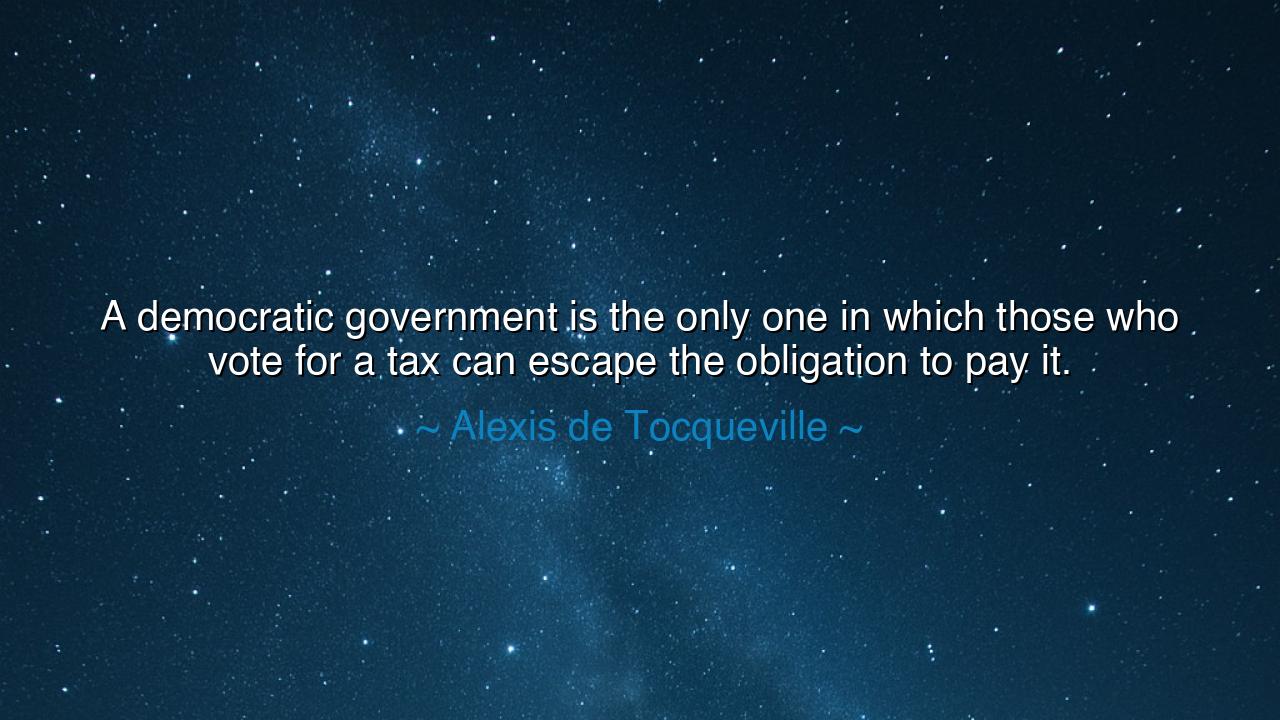
A democratic government is the only one in which those who vote
A democratic government is the only one in which those who vote for a tax can escape the obligation to pay it.






"A democratic government is the only one in which those who vote for a tax can escape the obligation to pay it." — Thus spoke Alexis de Tocqueville, a man who wandered among the young republics of his time and saw within them both the seed of greatness and the shadow of decay. These words, though calm in tone, strike with the quiet power of prophecy. They reveal a paradox of freedom — that when the people rule, they may also forget the duties that make them worthy of that rule. For democracy, when unguarded by virtue, becomes a theater where men seek not justice, but comfort; not the common good, but the private gain.
Tocqueville, that keen observer of the American experiment, did not despise democracy — he revered its promise. But he feared the tyranny of the majority, that slow and subtle despotism born not from kings but from the complacency of citizens. In monarchies, the ruler extracts taxes with the lash; the people pay because they must. But in democracies, it is the people themselves who vote for the lash — and then, with cunning or apathy, find ways to slip from its sting. Thus, those who shout the loudest for public welfare may be the first to flee when the bill arrives.
Consider the story of ancient Athens, that radiant cradle of democracy. In its early days, citizens gathered in the Agora, proud and vigilant, each willing to bear his share of the polis. But as time passed and empire grew fat, the people discovered how sweet it was to feast upon the spoils of others. The rich were taxed, the poor were fed, and votes became the currency of appetite. When war came — as it always comes — the treasury lay empty, and the same voices that had once demanded bounty now cried betrayal. Thus Athens fell, not by spear or sword, but by self-indulgence, by the illusion that one could rule and yet remain innocent of the burdens of rule.
In the same way, Tocqueville saw a future where the people, drunk on their own sovereignty, would become masters without responsibility. They would call for roads, schools, armies, and comforts — but expect “someone else” to pay. A hidden class of taxpayers would emerge, burdened by the many who contribute little yet demand much. And thus liberty would twist upon itself: the freedom to vote would become the freedom to exploit, and the ballot would replace the scepter as the instrument of oppression.
Yet there is hope in these words, if one reads them not as condemnation but as warning and wisdom. For democracy, though fragile, is also self-healing when tended by conscience. The people must remember that the republic is not a fountain of endless gifts, but a covenant of shared sacrifice. The taxes one pays are not chains, but offerings — the price of living among free men. To escape that duty is to dissolve the very fabric of freedom, for no society can stand when all wish to draw from the well but none to fill it.
In our own age, this truth resounds still. Many cry for justice, but few are willing to bear its cost. They seek prosperity without labor, benefits without burden. And yet, as the wise have always known, to enjoy the fruit of liberty, one must first till its soil. Democracy demands not ease, but courage — the courage to give, to act, and to be accountable. It is not a system for the faint of heart, but for those willing to hold themselves to the same standard they demand of others.
So let this teaching be engraved upon the heart: that freedom without responsibility is but a mask for greed. To vote is sacred; to pay one’s share, holier still. Each citizen must see himself as both ruler and servant, both debtor and beneficiary. When you next cast your vote, remember Tocqueville’s warning — that you cannot escape what you impose upon your brothers. Act, then, not as a beggar at the gate of government, but as a guardian of the common good, mindful that the strength of a nation lies not in what it takes, but in what its people willingly give.
Thus may the republic endure — not as a feast for the few, but as a shared altar where all bring their offering of duty, honesty, and hope.






AAdministratorAdministrator
Welcome, honored guests. Please leave a comment, we will respond soon